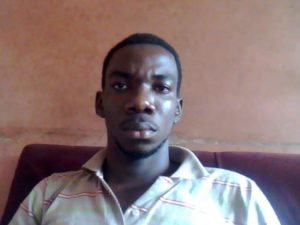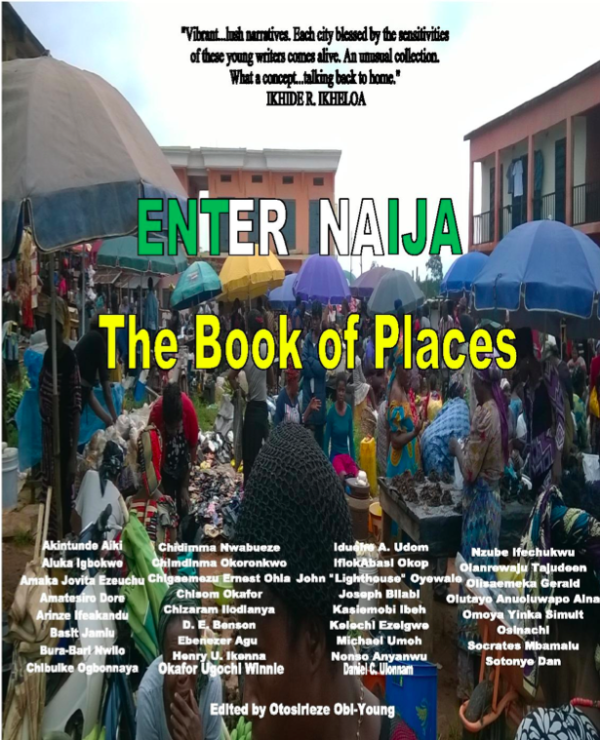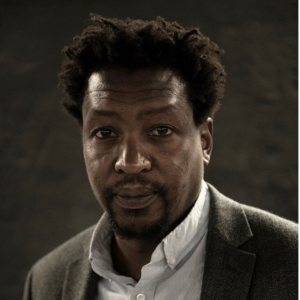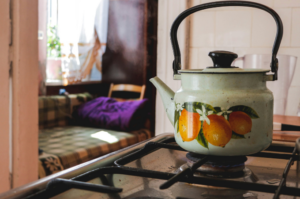CREEK ROAD IS a long tarred street in Fegge, the tar dust-brown with a thin overlay of sand from decades of trampling by variegated soles. Fegge is a district in the south of Onitsha—the headquarters of Onitsha South LGA—known for laissez-faire parents who raise streetwise children. Onitsha is a city of dwellers most of whom call “room” loom and say chop when they mean “shop”.
Nwañgene, a creek of the Niger River across Creek Road, is a collage by many artists. The centre, morphed into a pigsty and a tip by necessity, is a rank expanse of murky puddles, garbage, and fresh and decaying pig turds, sometimes human turds. It is a sprawling mountain, rearing up against the sky. Staking out a part of an edge of the creek is a vast clearing: Ọhanugo Field of the rust-freckled forward-tipping white goal. On the right of this field is a shack bursting with boys in their teens and early twenties, reeking of Benson and St Moritz cigarettes, of weed, kai-kai. Ringing this shack in a jagged circle are motorcycles and one or two teal Peugeot 504 saloon. People come to learn to ride—one of the boys behind on the pillion seat steering the learner’s knuckles steering the handlebars—and drive, Ọhanugo serving as a nurturing ground. On another part of the edge is a hoarding displaying colourful adverts.
In the mornings, Nwañgene is a lull of men—as pitch-dark as my penis—on their hunkers pissing, shitting, farting, each grimacing visage a peculiar pattern of scarification drawn from a handful of options. Pure white egrets swarm over the creek, hovering lowly over the verdant sward across the centre which is believed to overlay a brook, sometimes perching on the sward—webbed-feet birds don’t drown. In the afternoons, scruffy herdsmen goad their white and black and brindle cattle to the sward—four-legged creatures don’t drown, but how about the herdsmen? In the evenings, juvenile heads carrying waste bins—jerry cans cut open at their tops—pick their way through the bog of a tip, with alimi men—some seated on their heaps of scrap smoking, others scrutinizing with the aid of their knobbly staves a newly emptied dune of garbage, all of them mechanic-like in their sooty rags—scowling at them: “Carry it to the furthest inside; don’t empty that bin there; if you empty that bin there you’d pack it with your bare hands.” Or, when, by glancing up at it, they’ve sensed that a bin has prospects: “Empty it here, just empty it here,” pointing at once on the ground just before their feet. And the oink of fat taupe swine, the gurgle of their wet snout inside the algae-coloured puddles, flies rising in dense black clouds. In the leaden light of dusk, the white of the egrets glide through the slate-grey of the sky, away from the creek, their spread wings steady in the air, little kids flapping their hands ferociously in the manner of birds and singing out their lungs: “Chekereke nye m ’bọ ọcha k’ i were oji! Egrets give me white nails to take black!”
Years later, when the blessing Mr Peter Obi happens to Anambra state, Nwañgene would be dredged, and the problem of flood in Onitsha during heavy rains would be solved. Then, even the intimidating mountain would go; only the verdant sward, with the egrets and cattle that come and go, and Ọhanugo Field, with the shack and one goal removed, would be contributors to this abiding collage.
*
On October 2, we published Enter Naija: The Book of Places, an anthology of writing–non-fiction, poetry, memoir, fiction, commentary–photography and digital art about places in Nigeria created to mark Nigeria’s 56th Independence anniversary. The project, with a delicious Introduction by Ikhide R. Ikheloa, was edited by Otosirieze Obi-Young and features 35 contributors. We are republishing a few highlights from the anthology.
Download ENTER NAIJA: THE BOOK OF PLACES.
**************
About the Author:
 Nzube Ifechukwu was born on May 25, 1992, in Onitsha, Nigeria, where he also grew up. Originally from Ichi and Awkuzu, both in Anambra state, Nigeria, he studied electrical engineering at the University of Nigeria, Nsukka. He lives in Ichi and teaches physics and further mathematics at a secondary school in Oba, a nearby town. His Igbo poems (alongside their English translations also by him) and his Igbo translation of a fable by Ngũgĩ wa Thiong’o have all appeared on Jalada. He blogs at https://nzubeifechukwu.
Nzube Ifechukwu was born on May 25, 1992, in Onitsha, Nigeria, where he also grew up. Originally from Ichi and Awkuzu, both in Anambra state, Nigeria, he studied electrical engineering at the University of Nigeria, Nsukka. He lives in Ichi and teaches physics and further mathematics at a secondary school in Oba, a nearby town. His Igbo poems (alongside their English translations also by him) and his Igbo translation of a fable by Ngũgĩ wa Thiong’o have all appeared on Jalada. He blogs at https://nzubeifechukwu.










[The JRB Daily] JRB Contributing Editor Bongani Madondo up for Brittle Paper Literary Award – The Johannesburg Review of Books August 23, 2017 14:05
[…] “Nwangene,” Nzube Ifechukwu, creative nonfiction (Nigeria) […]